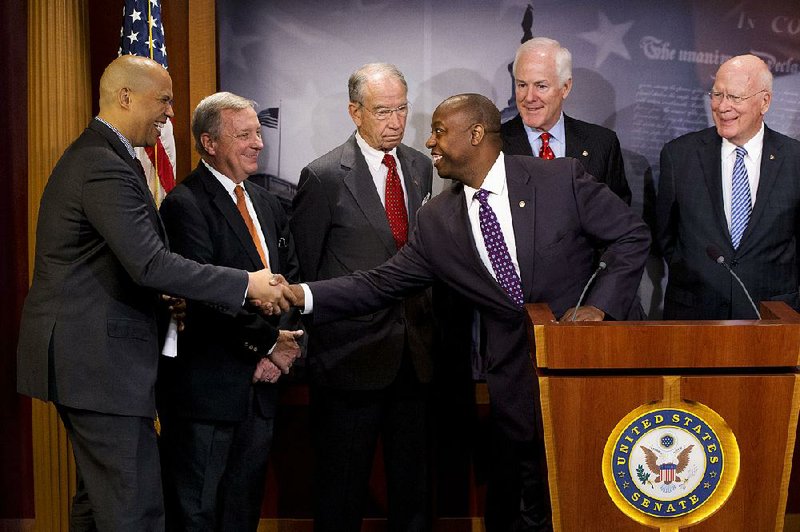WASHINGTON -- A bipartisan group of senators unveiled legislation Thursday that overhauls the nation's criminal-justice system, allowing some nonviolent drug offenders to get reduced prison sentences and giving judges greater discretion in sentencing.
"This historic reform bill addresses legitimate over-incarceration concerns while targeting violent criminals and masterminds in the drug trade," Sen. Charles Grassley, R-Iowa, chairman of the Judiciary Committee, said in a statement.
In the deal struck between some of the Senate's most conservative and liberal members, judges would have the discretion to give sentences below the mandatory minimum for nonviolent drug offenders. Some current inmates could get their sentences reduced by as much as 25 percent by taking part in rehabilitation programs, if they are deemed a low risk to offend again.
The bill would eliminate mandatory life sentences for three-time, nonviolent offenders.
Violent offenders, sex offenders and inmates convicted of terrorism charges would be excluded. Members of organized-crime syndicates and major fraud offenders also would be excluded.
The package, which was years in the making, was negotiated by Grassley and the top Democrat on the Judiciary Committee, Sen. Patrick Leahy of Vermont. Sen. John Cornyn of Texas, the No. 2 Republican in the Senate, and Sen. Dick Durbin of Illinois, the No. 2 Democrat, were also lead negotiators.
At a news conference Thursday, the senators congratulated each other for reaching a bipartisan compromise at a time when such agreements are rare.
"This is the way the system is supposed to work," Cornyn said.
At the same time, the senators acknowledged they weren't sure if such legislation would be accepted in the House. A House Judiciary Committee spokesman said the panel expects to introduce legislation soon.
In July, Obama became the first president to visit a federal prison while in office. He called for changes in the criminal-justice system, saying a distinction had to be made between young people doing "stupid things" and violent criminals.
On Thursday night, Obama praised the legislation, saying it "would provide a historic step forward in addressing these systemic problems." He noted "the movement to improve our criminal-justice system has surely attracted strange bedfellows," and he challenged "the broad and impressive bipartisan coalition that created the bill" to do what's necessary to "put a meaningful criminal-justice reform bill on my desk before the end of this year."
The bill would require all eligible inmates to undergo regular assessments to determine the likelihood of committing another crime. It would not authorize any new spending. But it would encourage inmates to take part in rehabilitation programs and other productive activities, such as working prison jobs.
Inmates deemed to be a low risk for a repeat offense could get their prison sentences shortened by 10 days for every 30 days they participate in a rehabilitation program. These inmates could serve the last part of their sentences in community-based programs in which they would be supervised by authorities.
The bill would reduce enhanced penalties that apply to repeat drug offenders. However, the penalties would still be applied to offenders with previous convictions for violent and serious drug felonies.
Among the senators' goals: make the sentencing system more fair, reduce recidivism and contain rising prison costs.
Since 1980, the federal prison population has exploded, in part because of mandatory minimum sentences for nonviolent drug offenders. In 1980, the federal prison population was less than 25,000. Today, it is more than 200,000.
The measure also limits solitary confinement for children in federal custody.
Republicans backing the bill include Sen. Mike Lee of Utah, Sen. Tim Scott of South Carolina and Sen. Lindsey Graham of South Carolina, who is running for the GOP presidential nomination.
Sen. Charles Schumer of New York, the No. 3 Democrat in the Senate, also is backing the bill, as are Democratic Sens. Sheldon Whitehouse of Rhode Island and Cory Booker of New Jersey.
"All of these things are rightfully bubbling up and I am happy to see unity from everyone from the Koch brothers to folks on the left, all joining together to say 'enough is enough,'" Booker said after the deal was announced.
"People are being entangled in the justice system who just shouldn't be," said Holly Harris, executive director of U.S. Justice Action Network. "So, too many people are in prison, we're spending too much money to keep them there, and we're not getting the public safety return we deserve."
A Section on 10/02/2015

